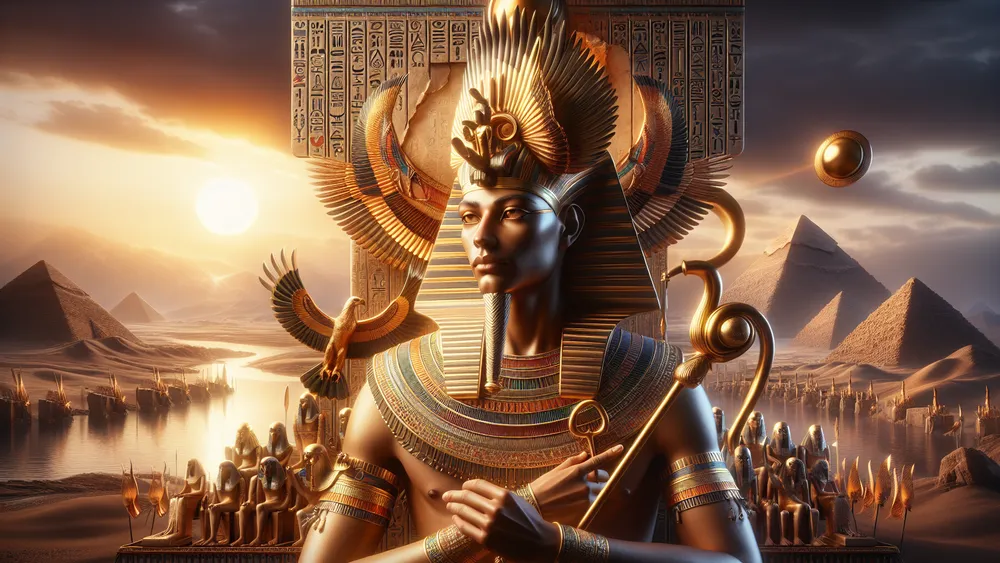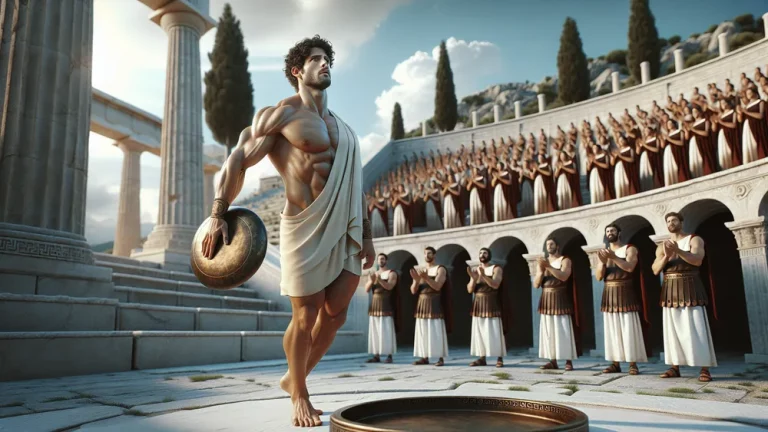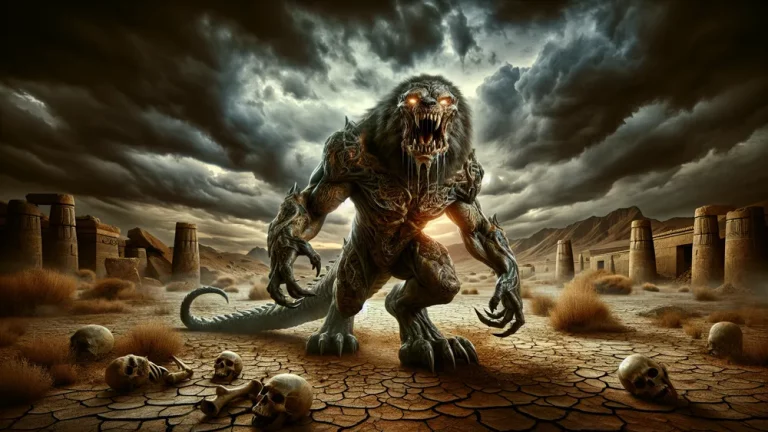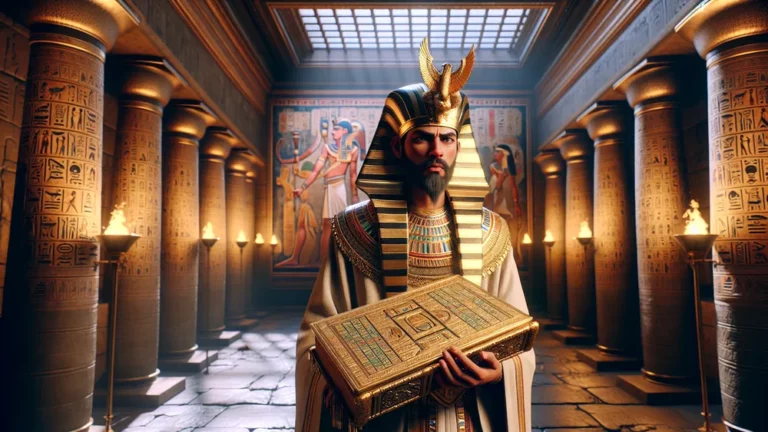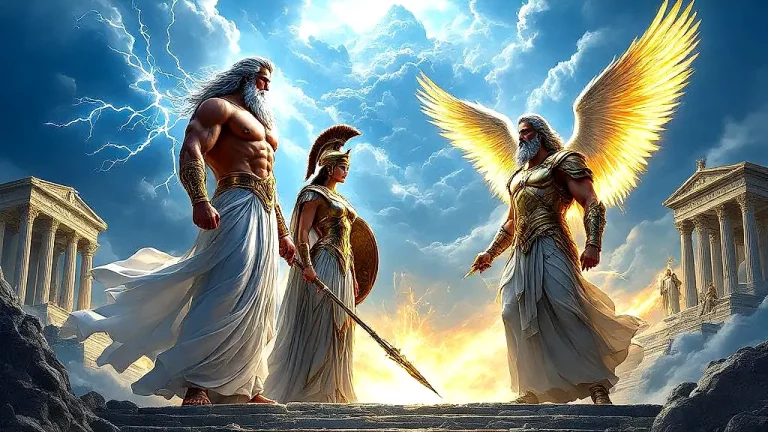Hu: Ancient Egyptian God Of Creation and Wisdom
Welcome to our look at Hu, who is the old Egyptian god of making things and knowing stuff. Think of an artist who spends a lot of time making a great piece; this is kind of like what Hu does in the universe. He is seen as a godly force of making and thinking.
Key Points:
- Hu is the ancient Egyptian god of creation and wisdom.
- Hu is linked to making and thinking, seen as a force of creation.
- Hu’s importance grew over time in Egyptian myths.
- Hu is part of creation stories, symbolizing the power of spoken words.
- Hu is often represented by symbols like the hieroglyph for the spoken word.
- Ancient Egyptians honored and celebrated Hu through rituals and offerings.
- Hu’s wisdom and creative power are still relevant in modern views of Egyptian mythology.
In this blog post, we will dig into Hu’s many sides, checking out his start, changes, and importance in old Egyptian myths. We’re going to find out how Hu is shown in stories about the world, the signs that stand for him, and the ways people honored and celebrated him.
We will also compare Hu to other gods like Sia and Heh, and look at how people used to chant Hu’s name. By the end of this look, you will know a lot about Hu’s spot in old Egyptian culture and his lasting mark in today’s ideas.
Hu: Overview and Key Facts
| Part | Information |
|---|---|
| Name | Hu |
| Job | God of Making Things and Knowledge |
| Linked Gods | Sia (seeing), Heh (lasting forever) |
| Signs that stand for Hu | Stick, Feather, Sign for “speaking” |
| Earliest Mentions | Old Kingdom (c. 2686–2181 BCE), in Pyramid Texts |
| Changes Over Time | Started as a small god, became important in making myths |
| Texts and Items | Pyramid Texts, Coffin Texts, Book of the Dead |
| Shown in Art | Often with a stick or feather, sometimes as a man with a sign |
| Ways of Worship | Rituals, offerings and chanting in places for creation gods |
| Modern Views | Mentioned in today’s books, movies, and games about Egyptian stories |
| Importance | Represents speaking power and smart creation |
Getting to Know Hu in Ancient Egyptian Mythology
To truly see Hu’s importance, let’s look closer at who he is, where he came from, and how his job changed in old Egyptian stories.
Who is Hu?
Hu is an important part of old Egyptian stories. He is seen as the god of making things and smarts. Think of Hu like a special artist whose words make the world. This shows the power of making with the mind. From the Heliopolitan story, his link to making things is known because he stands for the force of words that create. Hu often connects with other gods who add to his traits, like:
- Sia: The god of knowing and brainpower, who means the mind’s power to get and handle the world.
- Heh: The god of forever, standing for the endless and lasting part of the universe.
By knowing who Hu connects with, we see his many sides in the group of old Egyptian gods.
Hu is a god of creation and intelligence, linked with the power of words and connected to other Egyptian gods representing knowledge and eternity.
Where Hu Came From and How He Changed Over Time
Hu started back in the Old Kingdom of Egypt, around 2686–2181 BCE. He’s mentioned in Pyramid Texts, which are found on tomb walls of kings. These texts show Hu as very important in making the world, focusing on the spoken word power. Think of Hu like a significant artist whose words make things real. This shows his job in divine order and how talking made creation happen.

As time went by in Egypt, through different rulers, the view of Hu also changed. During Middle Kingdom (c. 2055–1650 BCE) and New Kingdom (c. 1550–1070 BCE), Hu’s importance grew too, and he appeared more in key texts like Coffin Texts and Book of the Dead.
These new writings gave him more roles, showing him as important in the afterlife and keeping the universe in order. There are items from these times, like amulets and temple writings, that show how they understood Hu’s god-like powers changing.
Over time, it’s seen that Hu’s character developed like a character does in a series, adapting to how ancient Egypt’s religion and culture changed.
Hu’s Part in Creation Stories
In Egypt’s old stories, Hu has a key role as the god whose words bring the universe to life. Think of Hu not as a storyteller but as someone whose words are so strong that they make reality.
In the Heliopolitan creation myth, Hu is a symbol of the creative word, working with other gods to create the physical world from chaos. His words aren’t just sounds; they are powerful forces that give shape and order to everything, showing the ancient Egyptian belief in the power of talking.
Hu’s power to create is shown in different stories as a basic part of how things were made. For example, in some tales, Hu’s words are like an artist’s brushstrokes, each word adding to the big creation. While other creator gods like Atum and Ptah have their own ways of making the world, Hu is special because he makes things just by speaking.

This shows how creation was seen in Egyptian myth, where different gods had different roles and each one added to the ancient idea of the universe.
What Symbols Represent Hu
Hu is often shown by certain pictures that point out his role as the god of making things and smarts. One main symbol linked to Hu is the hieroglyph for the spoken word. It shows his power to make the universe by talking. This hieroglyph is sometimes a drawn mouth or a reed, meaning the act of talking. In old Egyptian culture, these pictures were not just for art.
They were filled with important meaning, showing the thought that talking could change things.
The meaning of these symbols in old Egyptian ways is very big. They always reminded people about the godly power of words and how speech kept the universe in order. Hu is often seen in art next to other gods, shown talking or holding a scepter, a thing that means control and power. These images make his role as a creator god clear and show his wisdom. Common pictures of Hu have:
- Hieroglyph for the spoken word: A mouth or reed shape.
- Scepter: Meaning control and power.
- Images with other gods: Showing his teamwork role in making things.
When we know what these symbols mean, we see more of Hu’s role in old Egyptian tales and why his traits were so important.
How Hu was Worshiped and Celebrated
In old Egypt, people honored Hu through many rituals and events that focused on his role as the god of creation and smarts. They made daily offerings and said prayers to respect Hu, often calling on sacred texts that used his creative power. Think about these rituals like today’s religious practices with songs and prayers to respect a god. These daily actions were thought to keep the universe balanced and ensure the gods’ ongoing favor.
Specific events for Hu happened during big festivals and religious times. These events had big processions, food and drink offerings, and hymns that praised Hu’s smartness and creative skills. Temples and sacred places like those in Heliopolis were central for these rituals. These places were seen as the homes of the gods on earth, where divine and human worlds met.
Participating in these actions, the old Egyptians hoped to connect with Hu’s divine power and use his creative force to bring order and wealth into their lives.
Hu Today: Modern Takes and Pop Culture
Nowadays, in modern views of Egyptian mythology, Hu is known for his traits of wisdom and creative power, matching today’s values of knowing things and new ideas.
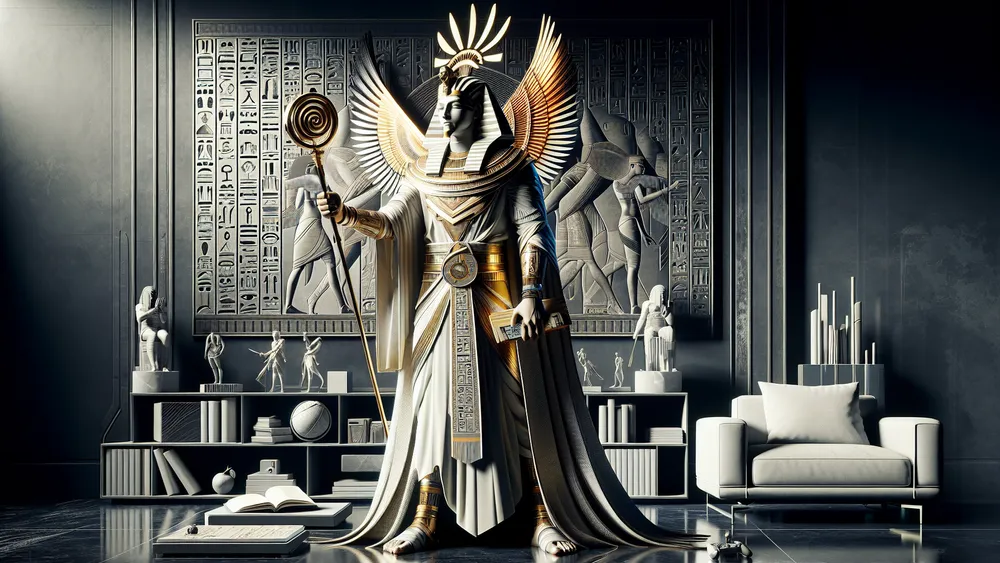
You can find references to Hu in different kinds of popular culture, for example, in books like “The Kane Chronicles” by Rick Riordan, where Egyptian gods have big parts, and video games such as “Assassin’s Creed Origins,” which looks at old Egyptian myths. Hu’s wisdom and creative power are very relevant today as signs of thinking hard and the power of new ideas.
Just like Hu’s spoken words were thought to make reality, now people see the power of knowing things and being creative to push progress and new things. This ongoing importance shows how Hu’s traits are timeless and still matter in our world.
Hu’s wisdom and creative power remain relevant today as symbols of critical thinking and innovation, influencing progress and new ideas.
Comparing Hu to Other Gods
Since we have looked at the importance of Hu in both old and current views, we should now think about how he is like or different from other well-known gods in Egyptian mythology.
Hu vs. Sia: Who’s the Smarter God?
Looking at Hu and Sia, both known as gods of wisdom in ancient Egyptian stories, we see interesting similarities and differences, they are quite fascinating. Hu is mainly linked with the creative power of words, showing the wisdom that makes the universe. But Sia stands for the idea of perception and insight, often seen as the personification of divine knowledge. Imagine Hu as a person whose words shape reality, while Sia is like a wise individual whose deep understanding reveals the truth. Both gods are important, but their traits and roles are different in interesting ways. Here is a table that shows these key differences:
| Attribute | Hu | Sia |
|---|---|---|
| Role | God of the spoken word and creation | God of perception and insight |
| Symbolism | Creative power of speech | Divine knowledge and understanding |
| Depictions | Often shown speaking or with a scepter | Often depicted with the god Thoth |
| Significance | Brings the universe into existence | Illuminates the truth |
Understanding these differences, we get a better appreciation for what each god adds to the rich stories of ancient Egyptian mythology.
Hu and Heh: Creation and Forever
In old Egyptian stories, the link between Hu and Heh is an interesting mix of creation and forever. Hu, with his creative power of words, makes the universe real. Heh, the symbol of endless time, makes sure this creation lasts forever. Think of Hu as a creator who makes something, and Heh as the keeper who ensures it stays around.
This teamwork shows up in many tales, such as the creation stories where Hu’s words form the cosmos, and Heh’s presence guarantees its never-ending existence. They both show the old Egyptian belief in life’s cycles and the never-ending continuity of the universe, showing how creation and forever are deeply linked.

The Special Chant of Hu
Since we looked at Hu’s connections with other gods, we should now look into the special habit of chanting Hu’s name and its importance in ancient Egyptian ceremonies.
Why Hu Chanting Mattered in Ancient Egypt
In old Egypt’s religious activities, saying Hu’s name out loud was a deep way to use the God’s creative power. Similar to how modern meditation or talking to a higher power brings calm and focus, chanting Hu was thought to call upon divine wisdom and help with getting what was wanted.
Repeating “Hu” again and again was seen as a way to get in line with the universe order, using the god’s power to make the universe real through speech. With respect to old records like temple writings and holy texts, they often note this habit, showing how important it was in both events and everyday rituals.

By chanting Hu, people in ancient Egypt believed they could use the basic creative power of the cosmos, connecting deeply with their spirit and changing their reality.
Hu Chanting vs. Om Chanting: What’s the Difference?
Hu chanting in ancient Egyptian practices and Om chanting in Hinduism both work as strong spiritual ways, but they are not the same in their cultural settings and goals. Hu chanting was used to call upon the creative power of the god Hu, getting the person in line with the cosmic order and helping with getting the wanted results. On the other hand, Om chanting is seen as the first sound of the universe in Hinduism, which stands for the true being and awareness. Both ways aim to link the person to a higher power, but Hu chanting looks at creation and divine wisdom. Om chanting focuses on unity with the universe and spiritual knowing. Here are how each chant matters in its culture:
- Hu Chanting:
- Om Chanting:
By knowing these ways they’re not the same, we see how each chant adds to spiritual ways in their cultures.
FAQs
1. What is the significance of Hu in ancient Egyptian mythology?
The significance of Hu in ancient Egyptian mythology lies in his role as the personification of the divine creative word and wisdom.
2. How is Hu depicted in ancient Egyptian art?
Hu is depicted in ancient Egyptian art often as a man with a scepter and an ankh, symbolizing his authority and life-giving power.
3. Are there any modern practices that involve Hu chanting?
Modern practices that involve Hu chanting are rare and not widely documented.
4. How does Hu compare to other creator gods in ancient Egypt?
Hu compares to other creator gods in ancient Egypt by embodying the power of authoritative speech and wisdom, whereas other deities often represent different aspects of creation such as physical formation or divine will.

